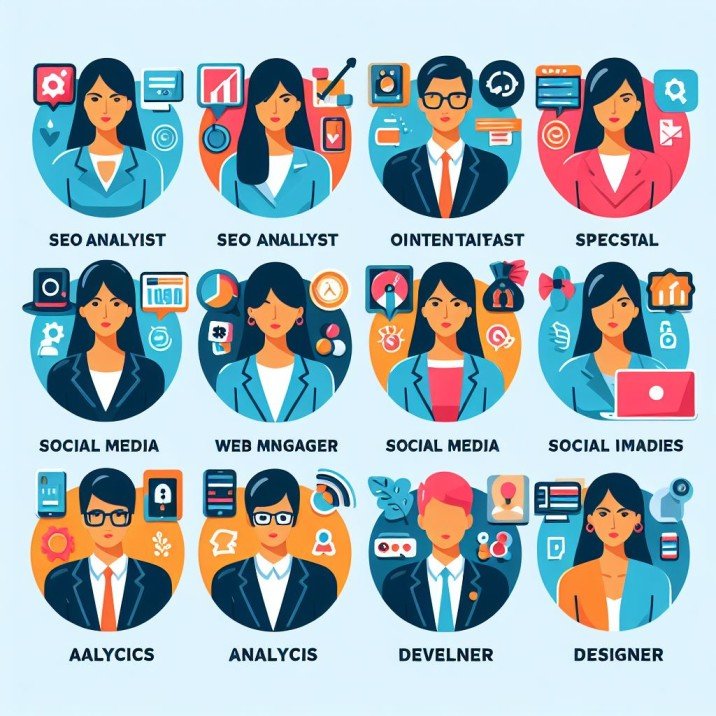The digital marketing landscape is constantly evolving, and with it, the demand for skilled professionals in the realm of digital marketing. From crafting captivating social media campaigns to optimizing websites for search engines, digital marketing encompasses a diverse range of skills and offers exciting career opportunities for individuals seeking to make their mark in this dynamic field.
This comprehensive guide delves into the various facets of digital marketing jobs, exploring the different specializations, essential skillsets, and valuable insights to navigate your journey in this ever-growing industry.
Digital Marketing Roles in Digital Marketing Jobs:

The digital marketing landscape boasts a plethora of specialized roles, each catering to distinct aspects of online brand promotion and audience engagement. Here’s a glimpse into some of the most sought-after positions:
Search Engine Optimization (SEO) Specialist:
- As the name suggests, SEO specialists are responsible for optimizing websites and content to rank higher in search engine results pages (SERPs). They conduct keyword research, develop content strategies, and implement technical SEO measures to enhance website visibility and organic traffic.
Pay-Per-Click (PPC) Specialist:
- PPC specialists manage paid advertising campaigns on search engines and social media platforms. They create targeted ad campaigns, set budgets, monitor performance metrics, and analyze data to optimize campaign effectiveness and generate leads or conversions.
Social Media Marketer:
- Social media marketers are the storytellers and community builders of the digital world. They craft engaging content, manage brand presence across various social media platforms, foster audience interaction, and leverage social media analytics to track campaign performance and gain valuable insights.
Content Marketing Specialist:
- Content marketing specialists are responsible for creating and distributing high-quality content that attracts and engages a target audience. They may write blog posts, articles, e-books, infographics, or other forms of content that educate, entertain, or inspire the audience, ultimately driving brand awareness and conversions.
Email Marketing Specialist:
- Email marketing specialists design, develop, and execute email marketing campaigns to nurture leads, promote products or services, and build customer relationships. They segment email lists, create compelling email copy, and analyze campaign performance metrics to optimize engagement and achieve marketing goals.
Digital Marketing Analyst:
- Digital marketing analysts play a crucial role in measuring and analyzing the effectiveness of various digital marketing campaigns. They collect and interpret data from various sources, identify trends, and provide actionable insights to optimize marketing strategies and maximize return on investment (ROI).
Essential Skills for Digital Marketing Professionals in Digital Marketing Jobs

Thriving in the dynamic world of digital marketing requires a unique blend of hard and soft skills. Here are some key attributes that employers seek in potential candidates:
Analytical Thinking and Problem-Solving:
- The ability to analyze data, identify trends, and troubleshoot challenges is essential for making informed decisions and optimizing marketing campaigns.
Creativity and Content Marketing:
- Crafting compelling content that resonates with the target audience is crucial for capturing attention and driving engagement. Strong writing, storytelling, and visual design skills are valuable assets.
Technical Proficiency:
- Familiarity with various digital marketing tools and platforms, such as SEO tools, social media management platforms, and analytics software, is advantageous.
Communication and Collaboration:
- Effective communication skills are vital for collaborating with team members, clients, and stakeholders. The ability to present complex information in a clear and concise manner is essential.
Data-Driven Decision Making:
- Making informed decisions based on data analysis is crucial for optimizing marketing strategies and achieving desired outcomes.
Staying Updated:
- The digital marketing landscape is constantly evolving. A willingness to learn and stay updated with the latest trends and technologies is essential for long-term success.
Valuable Tips for Launching Your Digital Marketing Career

Now that you have a better understanding of the diverse roles and essential skills, here are some practical tips to kickstart your digital marketing career:
Build a Strong Foundation:
- Consider pursuing relevant certifications or online courses to gain theoretical knowledge and practical skills in specific areas of digital marketing.
Network and Build Connections:
- Attend industry events, connect with professionals on LinkedIn, and actively participate in online communities to expand your network and gain valuable insights.
Showcase Your Skills:
- Create a portfolio website or blog to showcase your writing skills, content creation abilities, or campaign results. Consider contributing guest articles to industry publications or participating in open-source projects.
Start with an Internship or Entry-Level Position:
- Gaining practical experience through internships or entry-level roles is a valuable way to learn the ropes and build your resume.
Stay Curious and Keep Learning:
- The digital marketing landscape is constantly evolving. Continuously educate yourself by reading industry publications, attending workshops, and exploring new tools and technologies.
The Future of Digital Marketing: Digital Marketing Jobs
As technology continues to advance, the digital marketing landscape is poised for further transformation. Here are some key trends to keep an eye on:
Artificial Intelligence (AI):
- AI is rapidly transforming various aspects of digital marketing, from content creation and personalization to ad targeting and campaign optimization. Expect to see AI-powered tools become even more sophisticated, enabling marketers to automate tasks, gain deeper audience insights, and deliver highly personalized experiences.
The Rise of Voice Search:
- With the growing popularity of voice assistants like Siri and Alexa, voice search is becoming an increasingly important way for users to find information online. Marketers need to optimize their content and websites for voice search by using natural language and long-tail keywords.
The Metaverse and Immersive Experiences:
- The metaverse, a virtual world where users can interact with each other and digital objects, has the potential to revolutionize how brands connect with consumers. Expect to see brands creating immersive experiences within the metaverse, such as virtual stores, product demonstrations, and interactive events.
Focus on Customer Experience (CX):
- In today’s competitive landscape, delivering a positive customer experience is crucial for building brand loyalty and driving conversions. Marketers will need to prioritize personalization, omnichannel marketing, and building strong customer relationships to stand out.
The Evolving Landscape of Privacy and Data Regulations:
- With increasing concerns about data privacy, governments around the world are implementing stricter regulations. Marketers need to adapt their strategies to comply with these regulations and build trust with consumers by being transparent about data collection and usage.
The Continued Growth of Social Commerce:
- Social media platforms are increasingly becoming platforms for shopping, with features like shoppable posts and live streams. Marketers need to leverage these features to reach their target audience and drive sales directly through social media
The Power of Influencer Marketing:
- Influencer marketing remains a powerful tool for reaching new audiences and building brand awareness. However, brands need to be strategic in choosing partners and ensure their campaigns are authentic and resonate with their target audience.
The Importance of Content Marketing:
- High-quality, informative, and engaging content will continue to be a cornerstone of successful digital marketing strategies. Marketers need to focus on creating content that educates, entertains, and inspires their audience, while also aligning with their overall marketing goals.
By staying informed about these emerging trends and adapting their strategies accordingly, digital marketers can ensure they remain competitive and successful in the ever-evolving digital landscape.



